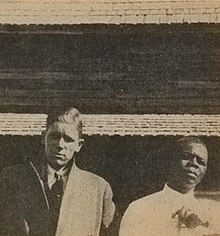Southern Tenant Farmers Union
Originally set up in July 1934 during the Great Depression, the STFU was founded to help sharecroppers and tenant farmers get better arrangements from landowners.Part of the New Deal, the AAA was a program to reduce production in order to increase prices of commodities; landowners were paid subsidies, which they were supposed to pass on to their tenants.The program was designed by President Franklin D. Roosevelt to help revive the United States' agricultural industry and to recharge the depressed economy.In order to alleviate this sector, the federal government under the Franklin D. Roosevelt Administration, through the New Deal, started economic incentives to reduce the production output of plantations; thereby, decreasing the number of sharecroppers and farmers needed in the fields.However, it never reached a formal bargaining position because plantation owners used violence and intimidation against the STFU leadership and its members;[5] for instance, the union's president, William H. Stultz, was arrested and threatened with death, and the visiting Director of western Arkansas's Commonwealth College, Lucien Koch, was seized at an STFU meeting, beaten and jailed.Cotton planters wanted to pay forty cents per one-hundred pounds that fall season of 1935 but the union, under H. L. Mitchell's direction, demanded one dollar.[7] In 1939, STFU activists organized protests by hundreds of cotton sharecroppers in the Bootheel district of southeastern Missouri, alleging there were mass evictions of tenants by landlords who did not wish to share federal AAA checks with them.The Farm Security Administration, a New Deal agency, responded by providing low-cost rental housing for 500 cropper families.It began to assist agricultural workers to allied various organizations from the South in order to create a stronger Popular Front.By separating themselves from the Communist Party, the union maintained its alliance between white and black workers and members, which was crucial to its identity and program.Once again, Mitchell, East, and liberal members of the Agricultural Adjustment Administration observed that this program had negative effects on land workers, leaving many unemployed.Furthermore, Clay East was able to promote socialist ideas within Tyronza through his leadership position by distribution its most successful journal, American Guardian, edited by Oscar Ameringer.However, when the STFU reached large towns, racial antagonisms were prominent since interracial relations were less frequent in these highly populated regions.In these towns the STFU created black and white localities, with their racially respective organizers to gain confidence from their union members.


Amalgamated Meat Cutters and Butcher WorkmenTyronza, ArkansasMemphis, TennesseeAmerican SouthH. L. MitchellUCAPAWAtenant farmersSouthern United StatesGreat DepressionworkingAgricultural Adjustment AdministrationNew DealPresidentFranklin D. Rooseveltagriculturalindustryeconomysupply and demandArkansasOklahomaMississippiMissouriTennesseesoutheastern statesCaliforniaWashington, D.C.Louise BoyleWorld War IsharecropperssocialistsharecropperArkansas DeltaCommonwealth CollegeHenry A. WallaceBootheelFarm Security AdministrationWorld War IIAmerican Federation of LaborDiGiorgio Fruit CorporationCorcoran, CaliforniaCongress of Industrial OrganizationsUnited Cannery, Agricultural, Packing, and Allied Workers of AmericaCommunist PartyprogressivesPopular Frontfood pricesOscar AmeringerOwen WhitfieldMarked Tree, ArkansasThe case of Paul PeacherUNC-Chapel HillFIGHT Against War and FascismAmerican League Against War and FascismMitchell, Harry LelandLabor HistoryThe Journal of American HistoryPolitical Science QuarterlyAgricultural HistoryMitchell, H. L.The Arkansas Historical QuarterlySouthern Oral History Program CollectionUniversity of North Carolina at Chapel HillKellner, DouglasAustin, TexasAlternative Views